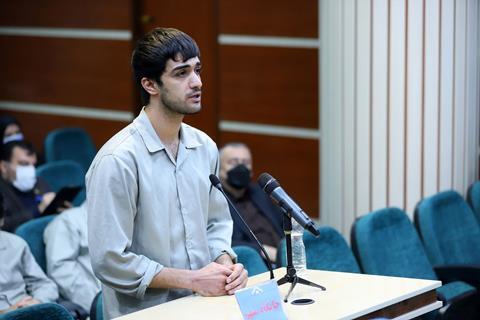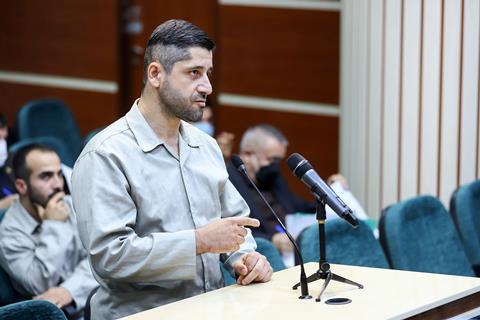Two men hanged in Iran on Saturday for their role in anti-government protests were denied their choice of legal representation and convicted in a sham trial, human rights campaigners have alleged.
The executions of Mohammad Mehdi Karami, 22, and Seyed Mohammad Hosseini, 39, were announced in a brief statement by the Islamic Republic News Agency, reproduced in the pro-government English-language news site Tehran Times under the headline 'Murderers of Ruhollah Ajamian are executed'. Ajamian was a member of Basij, a paramilitary volunteer branch of Iran's Revolutionary Guard, which has been involved in frequent clashes with protesters.
Foreign secretary James Cleverly today described the executions as 'abhorrent'.

Karami and Hosseini appeared on an Amnesty International list of 26 Iranians at risk of execution over the protests. The two were convicted following a group trial of 16 people for 'corruption on earth' before a Revolutionary Court in Karaj, Alborz province. Four people have now been hanged for their role in the current protests, which began with the death of 22-year-old Mahsa Amini in custody following her detention for breaching Iran's hijab laws.
International legal bodies, including the Law Society, have expressed concern about the lack of legal representation for those detained in the protests.

In a statement following Saturday's executions, the US-based Center for Human Rights in Iran (CHRI) attacked the conduct of the Karaj trial. 'From the moment [the two executed men] were arrested, they were considered guilty with no chance of being proven innocent because the cases against them were politically motivated,' said CHRI executive director Hadi Ghaemi. 'The Islamic Republic is using executions and lethal force against street protesters to instill terror in the hearts of the population to crush the Iranian people’s hopes and calls for change.'
According to the CHRI, court-appointed lawyers who take on such cases are denied adequate time to conduct a defence. Karami and Hosseini were hanged two months after their arrests.
Karami’s lawyer, who was blocked from representing his client in court, had tweeted that he would have sought an appeal if the judiciary had accepted his representation. Karami's father was reported as saying in an interview that he had been unable to contact the court-appointed lawyer. The lawyer added that the family was not allowed to visit Karami to say goodbye before he was hanged.
The journalist who conducted the interview with Karami's parents, Mehdi Beyk, was later arrested.
A lawyer who attempted to represent Hosseini has been quoted that his client had been tortured and beaten in Karaj prison.
Fourteen other people have been sentenced to death over the protests and are at imminent risk of execution, the CHRI said. More than 40 are facing charges that could carry the death penalty, which in Iran is typically carried out by hanging from a crane.
This article is now closed for comment.



























5 Readers' comments